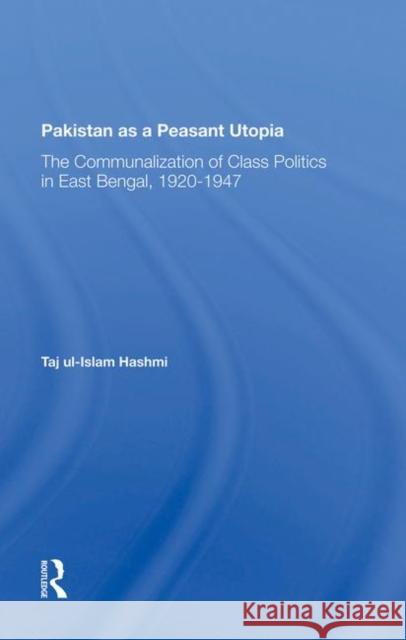Pakistan as a Peasant Utopia: The Communalization of Class Politics in East Bengal, 1920-1947 » książka
Pakistan as a Peasant Utopia: The Communalization of Class Politics in East Bengal, 1920-1947
ISBN-13: 9780367282158 / Angielski / Twarda / 2019 / 309 str.
Pakistan as a Peasant Utopia: The Communalization of Class Politics in East Bengal, 1920-1947
ISBN-13: 9780367282158 / Angielski / Twarda / 2019 / 309 str.
(netto: 676,35 VAT: 5%)
Najniższa cena z 30 dni: 654,86
ok. 16-18 dni roboczych.
Darmowa dostawa!
"During a substantial stay in some East Bengal villages in the summerof 1971, when East Pakistan was in the traumatic process of beingtransformed into Bangladesh, it first dawned upon me that peasantswere not stupid, devoid of political consciousness. Discussions withdifferent types of peasants revealed that at least the upper echelonswere aware of the implications of the liberation struggle forBangladesh and the superpower involvement in it. Richard Nixon andIndira Gandhi were familiar names. Ordinary peasants often quotedthe Bengali news readers and commentators of the BBC world serviceand the Voice of America. Well-to-do peasants who owned transistorradio sets regularly tuned into the British, American and Indian radiostations. Many inquisitive and worried peasants asked me (then a freshgraduate from Dhaka University) how their cherished Sonar Bangla(golden Bengal) would improve their socio-economic conditions. Manypeasants also took part in the liberation struggle as members of theMukti Bahini or freedom fighters. Almost everyone, with a few exceptionswho collaborated with the Pakistan armed forces, was a keensupporter of Bangladesh. After the emergence of Bangladesh, thingsdid not change to the expectations of the masses, but rather deterioratedso much that Henry Kissinger is said to have coined the phrase''bottomless basket"" as a denotation for Bangladesh, because of therampant corruption of a big section of the Bengali bourgeoisie at thattime. I was provoked to write the history of the peasants' glorious rolein the Liberation Struggle which was being overshadowed by claimsand counter-claims of heroism and sacrifice by members of theprivileged, parasitical urban elites. This work may be regarded as aprelude to the history of the freedom struggle that eventually led to thecreation of Bangladesh. This is an attempt to shed light on the peasantpolitics, almost synonymous with Muslim politics in the region, duringthe significant period between 1920 and 194 7 when East Bengal wasgoing through the political process that culminated in the creation ofEast Pakistan in 194 7."











